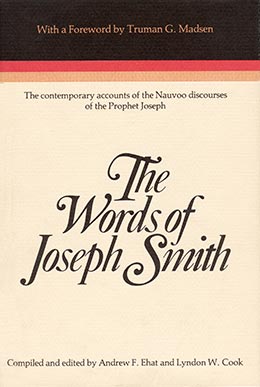15 August 1840 (Saturday).
No Immediate Contemporary Source[1]
[The first discourse by Joseph Smith on baptism for the dead.]
—15 August 1840
Notes
[1] On 10 August 1840, Seymour Brunson, member of the Nauvoo High Council, died in Nauvoo. The Prophet took the occasion of his funeral, on 15 August 1840, to deliver the first discourse on the doctrine of baptism for the dead (see History of the Church, 4:231). In a letter to John Taylor dated 9 November 1840, Heber C. Kimball provided the following additional background for this discourse. "Semer Bronson is gon. David Paten came after him. the R[o]om was full of Angels that came after him to waft him home, he was burred [buried] under arms. the Procession, that went to the grave was judged to be one mile long, and a more joyfull Season She [Vilate Kimball] Ses She never Saw be fore on the account of the glory that Joseph set forth" (Letter courtesy of Buddy Youngreen).
Although there is no known contemporary text for this discourse, Simon Baker (1811-63) left the following reminiscent account with the Historian's Office: "I was present at a discourse that the prophet Joseph delivered on baptism for the dead 15 August 1840. He read the greater part of the 15th chapter of Corinthians and remarked that the Gospel of Jesus Christ brought glad tidings of great joy, and then remarked that he saw a widow in that congregation that had a son who died without being baptized, and this widow in reading the sayings of Jesus 'except a man be born of water and of the spirit he cannot enter the kingdom of heaven,' and that not one jot nor tittle of the Savior's words should pass away, but all should be fulfilled. He then said that this widow should have glad tidings in that thing. He also said the apostle was talking to a people who understood baptism for the dead, for it was practiced among them. He went on to say that people could now act for their friends who had departed this life, and that the plan of salvation was calculated to save all who were willing to obey the requirements of the law of God. He went on and made a very beautiful discourse" (Journal History, under date, Church Archives).
